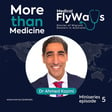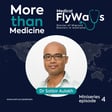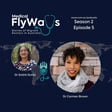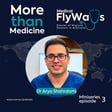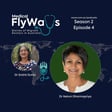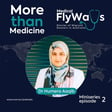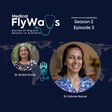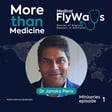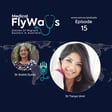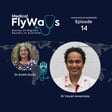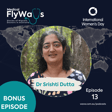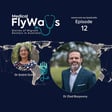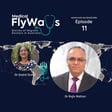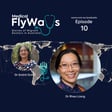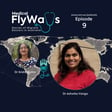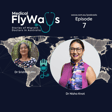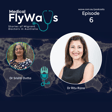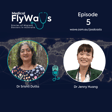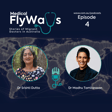Become a Creator today!Start creating today - Share your story with the world!
Start for free
00:00:00
00:00:01

Episode 8 - Dr Leslie Gan
On this episode of the Medical FlyWays podcast, Dr Srishti Dutta is joined by rehab clinician Dr Leslie Gan. Hailing from Malaysia, Dr Gan followed in her parent’s footsteps by completing her tertiary education in Perth before eventually settling in Queensland. Tune in to hear more about her journey and medical career in Australia.
Recommended
Transcript
Introduction and Background
00:00:01
Speaker
Medical Flyways The Untold Journeys of Migrant Doctors in Australia Hello Leslie, thank you so much for agreeing to be a guest on the podcast. Thanks for inviting me.
00:00:20
Speaker
Happy be Sunday morning. Indeed. And I have to say that i I would give an introduction, but it would probably not be complete. But the aspects that I know about you are that you are a very caring and thorough rehab clinician, and also a medical mom, a medical spouse, and a phenomenal artist. Oh, thank you. Very kind words.
00:00:47
Speaker
Lovely, thank you. And just so people understand, you're in Queensland, so we met through social primarily, social connections to begin with, and then have bumped into each other at work a couple of times in the non-clinical domain. Yeah. ah Queensland, big geographically, but socially actually quite small.
00:01:10
Speaker
Yeah, interesting, isn't it? And the medical community is probably even smaller than we actually think it is. It's quite incestuous actually.
00:01:20
Speaker
no I was thinking insular and you said incestuous and I have to speak both will apply. My filter sort of deteriorates as I'm getting older, so and my choice of words changes a lot. I don't know. I'm sure we're going to have even more fun as we go along and have this conversation. Okay, excellent. There's a couple of things I tend to probably want to find out about most people because there's you know such unique reasons, values, and principles that drive this aspect. is I'll start with asking why you chose to come to Australia. Well, essentially it was because well I hail from Malaysia and my parents actually did some of their you know ah tertiary study in in Perth in the 60s. So my dad is a graduate of UWA.
00:02:16
Speaker
He's a very old-fashioned solo GP in Malaysia and has been for many many decades still practicing at the moment and my mom was sent over to Perth to do secretarial college in those days when you still had to learn to type in those manual typewriters and do shorthand old way and they met and got married and then when after they finished they went back to Malaysia to live And they always had this dream that their offspring would come to Australia because they found a really, ah it's a good place to be in, you know, australia they felt after living in Malaysia, they thought, oh, gosh, this is a place that promotes equal opportunities and you can rise and in life by your own merit, you know, rather than race.
00:03:11
Speaker
or socioeconomic classes. So they always had this thing in their mind. And so when I came old enough to start thinking about university, they thought, oh, you should think about Australia. And and the fact is also it's too far from Southeast Asia, whereas the other options are like,
00:03:32
Speaker
not a kingdom, which is heck of a long way away. Different time zones, you know? um So my parents thought, okay, Australia, if you go there, you still get a taste of foreign living, but it's not so far that you're in a completely different time zone.
00:03:50
Speaker
And we thought, but okay, it's it's a good compromise. And it was interesting that you said your dad's solo GP. So, and was any of his Australian experience related to clinical work um or was he working here as a, I'm purely curious because I am one now and you've got me ah one thing about that. Was he working as a GP at any stage in Australia? No, I don't think he ever got to work here actually that's a good question. I had to go back and ask him where he did his internship, whether he did manage to get a year in personal. But it sounded like at the time, like after you got your MBBS, you could come out, hang a shingle out and call yourself and just practice as a GP. So they weren't all these things about that sort of thing. So you graduated your six years, you came out, you hung up a shingle and that was that.
00:04:43
Speaker
And so, but then he had to return to Malaysia being an overseas student himself. So he he went back to Malaysia and he set up his own. um That's not true. He had to serve the government. He had to fulfill government service. So the Malaysian government sent him off to Penang, which is a little island town towards the north of Malaysia. And that's where I was born. So he did his Malaysian intern year there.
00:05:14
Speaker
And then after that, he moved to another state. malaia That's where i my parents still live in now. And he he bought over any practice from another very old GP then. he He took over the clinic and just started from there. So I don't think he got to do any clinical work other than physical exposure he had as a medical student. So like I think it takes guts because we know, you know, when you come out of me school medical school, you know nothing.
00:05:46
Speaker
Like really, you know nothing and and to to actually start your own business and go, hey, come to see me when you're sick. I think that takes balls. I i think that ah starting a business in medical terms in even now takes a lot of guts and courage and risk taking ability, shall I add. so completely agree.
Cultural Adjustment in Australia
00:06:09
Speaker
So now and obviously you came and studied medicine here and was there ever a possibility or um thought about going back or was what well how did staying and continuing here come about for you? Yeah when when I came I was only 18 so it was my first time out of an Asian environment so it was actually quite a big culture shock for me when I came
00:06:37
Speaker
It was so confusing. I came, my parents enrolled me into, I stayed in a university college or dorm, as some people call it, and they deliberately didn't pick the national house. So they popped me into a college where it was all sort of the local Australian white people, or for want of a better word, I was one of a handful of Asian girls in the college. And it was a struggle.
00:07:07
Speaker
It's so ironic to think, you know, because I think like Asian people, we all look the same. Black hair, black eyes, kind of olivey skin. Hard to tell us apart, but I could not tell white people apart. Even though different colored hair, different colored eyes, everyone looked the same to me. It was terrible for the first three months. And then I had some trouble with Australian accent.
00:07:32
Speaker
Even though i i I grew up with English as my first language, even though I can speak Mandarin, the the accent is different. So I struggled a lot with that. And the confidence that local people, that the teenage girls seem to have with each other was something I was really not used to. So at that time, I thought to myself,
00:07:56
Speaker
God, I'll get my study and I'm going to run straight back home. you know this This is really hard. I don't think I can end up staying here. But I think when I was growing up, my parents were very clear to me. They always said, look, if you can manage to make a life for yourself away from Malaysia, do that. Don't come back to Malaysia. you know they They would sometimes say it like that very directly um and most times imply that.
00:08:25
Speaker
And I always wondered, why was that? And it comes out in sort of subtle ways. And I think it's because Malaysia, and without meaning to offend anyone, Malaysia is a Muslim country. And if you are non-Muslim, there's a sort of institutionalized racism in a way in Malaysia as well. So if you were Muslim, there were quarters for university, enrollment, company benefits and and things like that. So my parents at always felt if our kids were capable enough to get ahead in a different country, take up leadership or permanent residency elsewhere, we were encouraging them to go.
00:09:17
Speaker
So I always, when I came here, I always had to start. My mom and dad wouldn't be, I mean, they'd be sad, but they wouldn't be shocked. I chose to stay. That was how we were encouraged.
00:09:31
Speaker
yeah it's It's interesting because I think that there's a few things you touched on and the one that it reminded me of when I went to the UK for taking the PLAB exam. I think one of the things that there was a course run by another Indian ah doctor of indian origin and i think the first thing he said when we started practicing was keys was he said well if you think they have an accent then you must understand that you have an accent for them too and i you know it was interesting cuz we i don't know that i'd actually thought about like that but that communication and communicating well can can be quite a challenge particularly
00:10:15
Speaker
I'd imagine in your instance, it was much more difficult because this was not a hierarchical defined doctor-patient kind of situation. This was very social. Yeah. It was even hard for me as an 18-year-old to walk into the dining room to get my meals by myself. All I saw were these, to me, my perception was all these young 16, 17-year-old Australian girls incredibly confident and fairly loud. A lot of them were pretty loud to me at the time. Confident girls walking in, chatting, chatting, happy, happy, and there I was. I couldn't tell anyone apart, mind you, having trouble understanding what they were saying because of the accent. The thing that always struck me, the first thing that hit me when I landed in Brisbane was
00:11:07
Speaker
why can't people just say no as an oh no what's this no business that the little squish of the oh at the end that that used to what what is this you know so it was it was a big shock to the system. i just so So here's my question. do you feel so you know that This is one of the things I probably observed more than I should at times, but there are small acts of inclusion often that make someone who comes or enters a tribe that they don't by default belong to, that that kind of eventually gets them.
00:11:45
Speaker
comfortable enough. Do you remember anything anecdotally? Any stories, any people, any incidents that might have helped you in that domain? Being, like, to feel included. Yeah. And in that setting, in terms of… that Oh, in that setting. Well, it was fortunate. When the term started, there was another very incredibly outgoing Singaporean girl who came back from holidays and she was she'd already been in college for in staying in the same dorm for about a year and she I think it's just her nature anyway she was incredibly outgoing very sociable and obviously being having been there already a year she was being extremely comfortable with the sort environment as well so she
00:12:35
Speaker
me and she started to take me under at her wing and started to, you know, insist I sit with her and she would sit with anyone. She was one of those people. She'd grab a plate and she'd see some group with a spare chair and she'd just crash in it whether she knew people or not. So and so she dragged me with her and that that helped a lot immensely and she'd make the introductions. to this I mean, I never ended up having any, you know, BFFs as people say these days.
00:13:04
Speaker
any any besties in college. But there was enough recognition that I could say, hi, you know good morning, that that kind of thing to different people. And it was quite formative, I think, that that first year, because eventually I learned that, hey, I don't really have to sit with anyone to eat a meal. If I didn't feel like walking, I'd just sit on a table on my own, and it was no big deal. And I'd grab a newspaper or bring my book, and because I'm fairly introverted.
00:13:32
Speaker
You know, and I'm getting more and more introverted as I get older. So that started to form like put lay in the foundation for the kind of person that I am. I am.
00:13:45
Speaker
right now in terms of the confidence. so yeah having Having Abra there, that was a friend of mine, that really helped a lot. That reminds me of the other domains. We have intersected in in work. I'm not going to name employees, et cetera, but that confidence of being or near on your own, but having a voice of your own as well. Do you think that experience has influenced the other decisions you have made and how you interact with you know people, colleagues socially now? Yeah, I think so. Definitely, as an 18-year-old, probably with most 18-year-olds, I didn't have a lot of confidence. And coming from
00:14:32
Speaker
and Asian society, you're not really encouraged to stick out, you know what I mean? You're not encouraged to stand up for yourself. You go with the flow of what the consensus opinion is. And your opinion isn't always part of that consensus. That's right. Your opinion isn't always part, but if you stick out too much, someone is going to smack you down. And you weren't really encouraged to put forth any controversial thoughts of any sort.
00:15:00
Speaker
So I think just in general those three years I stayed in college for three years it's and I got to know a lot of different people and talk to some different people and met other international students as well. So it it did help a lot for me too.
00:15:19
Speaker
to develop the way I am. Also, I think my years working as a doctor and going through the system and discovering myself some pieces along the way formed me. Yes, and and I must say here that even though Leslie describes herself as an introvert, I've had some fantastic interactions in social settings and never been concerned about having met her for the first time at one of those.
00:15:46
Speaker
So say hello when you see her, if you do see her. I'm laughing. Aren't we all? Aren't we all? Now your choices, I mean, so the next thing is a but a rehab medicine, which, i you know again, it's not necessarily a conventional choice. what What attracted you to it or led you to it? Well, I didn't even know it was a thing. My my intern, JHO, yeah, I did it in Toowoomba.
00:16:15
Speaker
small hospital, actually really, really great to work in. I was just going to go along the conventional pathway of, you know, physician food. I knew I really liked to work with people, which is ironic seeing that I said I'm an introvert. I actually enjoyed hearing of people's stories and talking to them. I didn't mind old people either, so for a while I thought, oh, maybe I'll be a geriatrician. I think. So I thought, okay, so that's the RSVP pathway, going to have to be, sell my soul to be a med-reg, you know, a very traditional classical pathway. So I did that, I was a med-reg for a while. And it was very supportive and to one mother boss, this was great. It was busy, but you know, at one stage, we were so short of doctors, we had four med-regs to cover seven days a week. So you can imagine what that was like. But it was a good
00:17:11
Speaker
working and learning experience.
Career Path and Burnout
00:17:14
Speaker
Then we my husband and I, we moved down to Brisbane and I took up a job at a certain hospital. That that broke me. That experience was not optimal, so I resigned because I had become so burnt out then and so cynical that I Every day when I was driving to work, I felt like turning the steering wheel to drive myself off the road and just ended because it was not good. so And I was dealing with some other stuff at the same time at home. And I thought, okay, this is no good. So I resigned and I decided to take like a sabbatical
00:17:57
Speaker
period to think about what I wanted to do myself. So I did my usual, but you used still have to earn money, right, to survive. So I offered myself as, as more cold to even those private hospitals, like Sunnybank private or Greenslopes. And I took the out old after hour shifts and paid very well. But it was, it was, you know, not terribly exciting. I believe it still does. So incredibly well paid. But Just usual ward call stuff, nothing, nothing too exciting. And at the same time, I was just for the fun of it, I decided to do a diploma in acupuncture at one of those natural health colleges that doesn't exist anymore, but just for the fun of it. So I did that and I worked for some of the Nicalides warfarin care program. Just dosing INRs, again, paid very well, but boring as hell because all you have to do is dosing INRs, but it was easy work, you know.
00:18:54
Speaker
And so I did that for three years. And then at the end of it, after my anger had seeped out of my system after three years, I was talking to some friends and they said, oh, have you thought about this thing called rehab medicine? I was like, what the heck is that? And they said, oh, you know, after people have a stroke or whatever, they need someone to look up on. So it's it's a new, newish specialty just coming up. And they said, oh, you should talk to such and such a person who's just finished or something like that.
00:19:23
Speaker
Oh, I know that person. She was a mate from uni. So I rang her up and we had a chat. And my timing was good because just as I decided to call one of the consultants who was doing trainee interview recruitments at the time, it was happening that very week on that very Friday. And I managed to score the last interview spot on a Friday afternoon 4pm.
00:19:50
Speaker
So I went for that interview and they said they they did me a deal because at the time that was 2006 and there were very few few rehab trainees and I think they were like yeah I think they were like four four registrars for the whole Queensland that that sort of thing it was so um unknown and they said oh okay we're doing a deal if you take up the training position in Gold Coast at the time because nobody wanted to go to Gold Coast because it was a drive from Brisbane you do six months at the Gold Coast, we'll give you six months in PA." I was like, yeahsh yeah, Yeah, sure. No problem. I lived around Logan anyway, so it's not a big deal. So I said, okay, do done. And that's how I kind of almost accidentally fell into it. And I just kept going. It was very enjoyable.
00:20:40
Speaker
convoluted but got there at the end. No, it's interesting you said that. and And what you described is probably not unusual for many of us to have made the most of whatever opportunities have come our way. And, you know, I mean, I'm sure when you took that up, you weren't saying, I'm going to be a consultant of rehab in x number of years time at that point of time, that kind of ability to you know say yep this looks like I might have some fun right now doing it so let's just give it a go. It was a way back into orthodox training programs and I thought this this sounds like something I might enjoy so let's try it out and see where it leads me. Now you mentioned a couple of things that makes me think about something that I was planning to ask you but in a different vein is you know all of this so study, career,
00:21:36
Speaker
I know you have two beautiful girls doing all of this away from the traditional family supports and the usual people that often here, i you know I spoke to my cousin, I spoke to my you know the traditional usual people that you would go to, doesn't always exist for those who are living and working in a country that wasn't their birthplace. so Who were the people that you went to or who were the people that were around you or supported you? I don't have any immediate family here. So even now it's my husband, myself, and our two girls. Back then, i had ah I have two siblings. I have a sister. At the time, she was pursuing architecture.
00:22:29
Speaker
when she was at UQ studying, and then after that she got a job as well as she was working. she like but She's not living in Australia anymore, she's overseas. So she wasn't exactly a source of support for me because we we were we were just not close. We're much closer now, now that we're older, but back then we were not close. And so we, I think as a person, generally very self-sufficient anyway,
00:22:58
Speaker
I did and I still do talk a lot with my mother on the phone then before internet was a real thing you we wrote a lot of letters a lot of those those aerograms that you followed up and so lots and lots of letters were flying to and fro and then you'd have to you know ring an international phone call on the landline and oh my god it sounds so old yeah ring letters do sound old yes i agree letters and landline, traditional phone calls, not even WhatsApp. There's no such thing then, you know. So I did that. And my my mom was always very, is still a very good sounding board for any thoughts that I needed it to talk through. And she's, to this day, she's an incredibly pragmatic and realistic woman. So she's an incredible source of strength to me.
00:24:02
Speaker
My dad, he, it was very much a gendered traditional role. Like my dad is your usual man of the house, earn money, bring the bread home. You know, mum did everything else. Dad was just there as a pillar in terms of finances. But um I know that he's a big source of support for my mother. So probably his strength came through her to all of us kids.
00:24:32
Speaker
But I had some friends to talk to, the community I had when I was an intern in Toowoomba was very
Support System in Australia
00:24:43
Speaker
private. So that was helpful. And my husband is also oh very much a pillar of strength to me. So yeah, I'm fairly insular looking person.
00:25:00
Speaker
I think. You say that, but I suspect if I, it sounds to me like that that you knew who to go to rather than you didn't have the people is what you're saying. Yeah, I had certain people to rely on to bounce ideas off. It wasn't a huge risk. It doesn't have to be. Yeah. yeah but it's And you've kind of clearly nurtured those and kept them, those kind of important people you know, always connected with you is what I'm hearing from what you've said. So that physical distance doesn't mean that you can't continue to lean on them when needed. Yeah. That's, that's an interesting way of looking at it. I hadn't and another, I'm sure I have done similar in some ways, but, and in terms of your career or work, do you, can you think of any more
00:25:50
Speaker
Popular terminology and the more conventional terms, not conventional, I suppose the more au fait terms we have these days is mentors and coaches. And so do you think there were any in particular through work or your career that you would you were either inspired by or that you would think had a significant contribution to where you are now in terms of work? I think through my training,
00:26:20
Speaker
There weren't any specific one person that I idealized. I sort of looked at all the different bosses I worked with, whether it's of my specialty or not. And I thought, oh, I really like that trait. I got to remember how this person does that. That's really good. I felt that down. Or if I see something, I go, oh, I don't want to be like that.
00:26:44
Speaker
No, no, no, i don't I'm not going to do that. So sort of pick and choose the trades you want and the trades you don't want. ah one One of my bosses really stuck with me and to this day he still remains a a good, and' I'm pretty sure he's still humbled to acknowledge that he's my mentor, but I'm happy to say he's my mentor. So he was my old one of my old bosses down at Gold Coast and he's still there right now. Dr. Ben Chan, he's one of the rehab bosses down there.
00:27:14
Speaker
and he's such an unassuming, quiet, kind man, but there's this incredible steel in him.
Mentorship and Career Influence
00:27:23
Speaker
And I don't know how he does it, because he looks so unthreatening, but he can manage to get so much done, and he can get the executives to listen to him, so that he can build the service and the department to how it should ideally look that I'm constantly amazed at how he does it and I still don't know how he does it and I'm still trying to learn. But to him, I've learned that rehabilitation medicine doesn't need to be just confined to the transitional ideas of rehabilitation. You can look in a more broader direction in terms of disability
00:28:11
Speaker
for us to apply our skills to. There are some people who think, okay, rehab, you only do this and these are the only areas you work on. He doesn't see it that way. He says, if there's a niche where our skill set will work or help, go for it and get it, especially if no one is interested in that. That's an opportunity for us as clinicians to dive in and make a real impact.
00:28:39
Speaker
um And that's something that really stays with me so much. I mean, ah can I say something? It sounds like your dad's principles as a GP have somehow got through into you being a rehab physician.
00:28:54
Speaker
That perfectly described that general practice does a lot for the rest of the medical fraternity as well in some ways. Oh yes, yes. He'll be happy to hear that. He'll be very happy.
00:29:06
Speaker
I'm sure that idea of a whole person care and and not being constrained by what other disciplines is defined or other single organ specialties have chosen to address very much aligns between primary care, I mean, general practice and rehab. And again, when we worked in certain areas, our comments have been have been aligned very much for those reasons.
00:29:34
Speaker
Yeah, yeah, yeah. And and that that reminds me, that's just triggering thoughts coming back to me from what my dad tells me of his clinical practice. When I was a little girl, actually he would say, you know what, today I saw this patient and she was too old and couldn't bend over to cut her nails. I cut her nails for her in clinical. And he said, I don't have a problem doing that. And I was like, you know, I think that's subconsciously influenced me, just that kind of willingness to be of service, whether it's within your scope or not. I mean, anyone can cut nails, but not everyone will offer. That is very true. Yeah. So to this day in hospital, if I see any of my patients who come in with claws for nails and your diabetic or the nurses are too worried to to trim them or the podiatrists are too busy to come,
00:30:26
Speaker
cut them. But I'll get on my knees and cut them because I can't stand it. And you can't walk with claws for nails. So that's how I try and impart my ideas to my registrars and residents if you can help do it. but Don't be silo minded about this. Absolutely. And they are lucky to have you is how I'm thinking of it now. But now there's an aspect that I can't not bring up, which is the thing that I first noticed about you when you shared some of your work and your artwork on one of the medical groups.
Art as Therapy
00:31:03
Speaker
So like tell us a bit more about it, because I know I can signpost that Leslie has a blog called Leslie's creative thoughts.
00:31:11
Speaker
Have I got the right accent? Occasionally I go and have a look at you know photos and artwork and sewing. What have I missed? There's so many things you do in that domain. what what's Tell a bit more. like i know there's there' We could spend half an hour talking just about that, but I'll let you let you speak to it rather than me ask you questions.
00:31:34
Speaker
How much time have you got? Well, what i use who dang this is the carrot I use to tell my trainees out there. So to all the registrars listening out there, when you finish your exams, you will have so much time to yourself that you won't know what to do, because that's what happened to me. After I finished my exams, I was like, oh, wow, I can have a life now.
00:32:01
Speaker
but But also, the that's why I'm forever always very grateful to Australia, because you get so many opportunities to try different things that you normally wouldn't. Like when in Malaysia, there were certain expectations that you a person would behave in a certain way, do certain things, and that's that. But in Australia, you can try all sorts of things, and it's no one's going to bat an eyelid.
00:32:28
Speaker
you know so I've tried a lot of things. I picked up the cello when I was 30 years old. I'm almost 50 now. and So that's still an ongoing hobby. I still take lessons. I picked up the cello a few years ago and I'm still taking lessons. Then when I was pregnant, I thought, okay, maybe I should try and learn to sew. So I took some sewing classes and
00:32:59
Speaker
No, I do patchwork and embroidery and hostage when I feel like it. And the painting stuff came by purely by accident because you know how you work and then especially hostels, people love meetings. not You could do your whole life just meetings alone, right? I'm sure someone out there does it, Leslie, but not you and me. No, but if' they are the especially if you're not chairing it,
00:33:28
Speaker
You're just a listener. It's so boring sometimes. It's so boring. And I i like to multitask. So I started to doodle on pieces of a paper or journals or whatever. And one day I looked at the result of my doodling. I thought, hey, this isn't too bad. I thought, OK, if I can doodle, maybe I can my maybe i can paint.
00:33:51
Speaker
So I went to a local art shop and just bought some cheap stuff. And then I started to play around with paint and stuff. And I thought, oh, this is actually quite fun. Then it started to grow from there. Paint maybe started small and then, oh, maybe I can paint bigger. and Then it started ah to fun gate out like a tumor, you know, sort of.
00:34:13
Speaker
And when I started with my painting, I started to add fabric collage, because I've now got fabric scraps coming out of my ears, because being a score, you have fabric everywhere. I started to stick it on in multimedia. The sky's the limit, really. So I have a room in my house. It's just dedicated to my mess that I do not allow anyone to go in. You know, creative rooms for my sewing machine, my serger, my paints, my, you know,
00:34:40
Speaker
rubbish is all in there and I do not let cleaners in there as well because there's no point cleaning. There's just no point cleaning. That room is destroyed with paint and fabric scraps. When I move out, I'll have to redo that entire room. Yeah, so it just kind of fungated from there. And yeah, I don't do as much painting as I used to.
00:35:02
Speaker
For a while, I was doing a lot of commissions for, you know, medical mums and stuff. I did that for about three years or so, but it started to get stressful. Depending on other people, it started to get very stressful. So I stopped taking commissions, except for the odd one. Now and then, where the theme catches my fancy, that i might I might do one. But nowadays, my pain usually is for myself. It's to indulge my crazy imagination.
00:35:31
Speaker
um i mean I absolutely encourage anyone to go have a look at that blog. I love having a look every so often. Now before I let you go, one last question is if if there's someone out there listening, particularly someone that's in Malaysia or they maybe have similar thoughts as you, think of themselves as an introvert, not sure about coming to Australia or choosing medicine.
00:35:56
Speaker
Are there any salient words of wisdom you would like to share with them or anything you would like to leave them with in terms of inspiration?
Advice for Aspiring Doctors
00:36:04
Speaker
To anyone who is thinking about those things, medicine, it's ah it's ah it's a difficult road. It's a long and difficult road. When you do finally finish as a fellow of something or a specialist in something, it's very fulfilling that there will be difficult spots along the way and the kinds of patients we see are forever evolving and I think they're in actual fact because now we're expected to look at people a lot more holistically and take into account psychosocial factors as well. It's a lot more challenging than just giving someone a tablet or cutting out some diseased part. There's a science to medicine as well as an art and I think
00:36:55
Speaker
People often don't realise that you are part of the healing process. You you as a person. um So it it is really beneficial for you to develop yourself as a person.
00:37:12
Speaker
So you bring something of yourself to that healing, to that treatment of the person. So it's worth it. The journey is long and complex and sometimes it's incredibly frustrating. But once you finish and you have a little bit more autonomy over how you practice in your style of practicing and where you practice, it's it's worth it. I think it's worth it. Australia is a beautiful place to live in.
00:37:39
Speaker
although Brisbane's a bit too hot for me right now, but it's a lovely place to live in, plenty of opportunities, and what I do like about Australia is people... I know some people say there's racism or whatever, but I've never really found that. I think in comparison with Malaysia, people here are incredibly accepting, I think, generally very non-judgmental,
00:38:07
Speaker
There are plenty of opportunities for you to try different aspects of yourself, exposing yourself to different aspects of skills, learning that you wouldn't have in a much more regulated society, like in Malaysia or Singapore. That's why I love about Australia. it's I know we all winch a lot about it, but it's an incredibly welcoming place and I don't regret being here at all.
00:38:35
Speaker
Awesome. I agree with you. We've often come from more hierarchical and more structured um and kind of gaining that autonomy and discovering all these other aspects of yourself is quite a journey in itself, isn't it? Absolutely. Thank you for sharing so much of yourself, Leslie. I'm very grateful and I'm hoping that somewhere out there will listen to this and be inspired to bring their full self to this world. ah If I could help them, just one person.
00:39:05
Speaker
By what I'm saying, then that's... I've done my job. It's great. I am sure we will. I am sure. Thank you for having listened to this episode of Medical Flyways. I hope you have enjoyed this episode and will return for future ones as well. We would like to give you the opportunity to nominate a guest or any person you feel who is a suitable guest and who may have inspired you in your workplace or journey. So please leave us a comment and we will attempt to invite them to our podcast.
